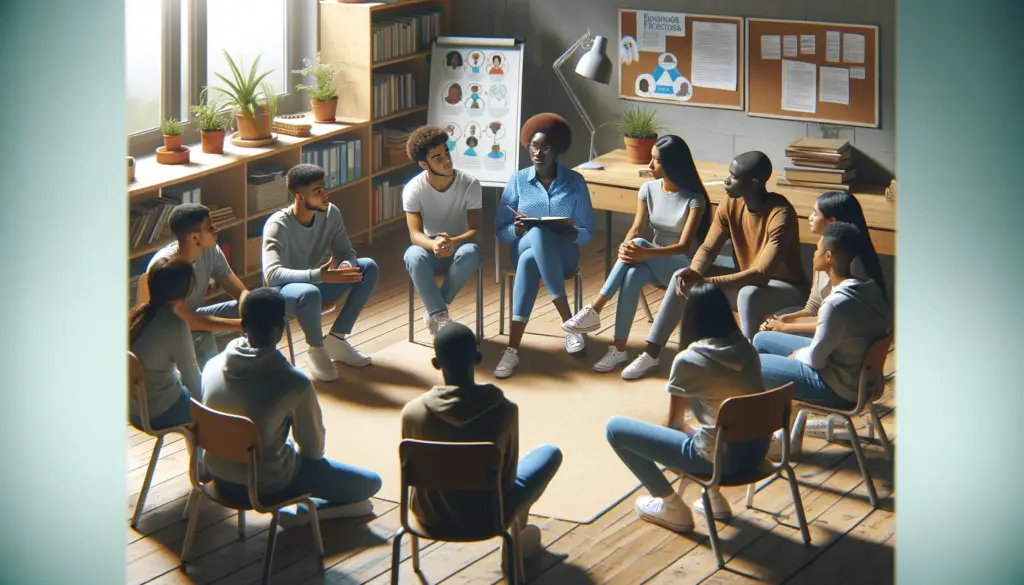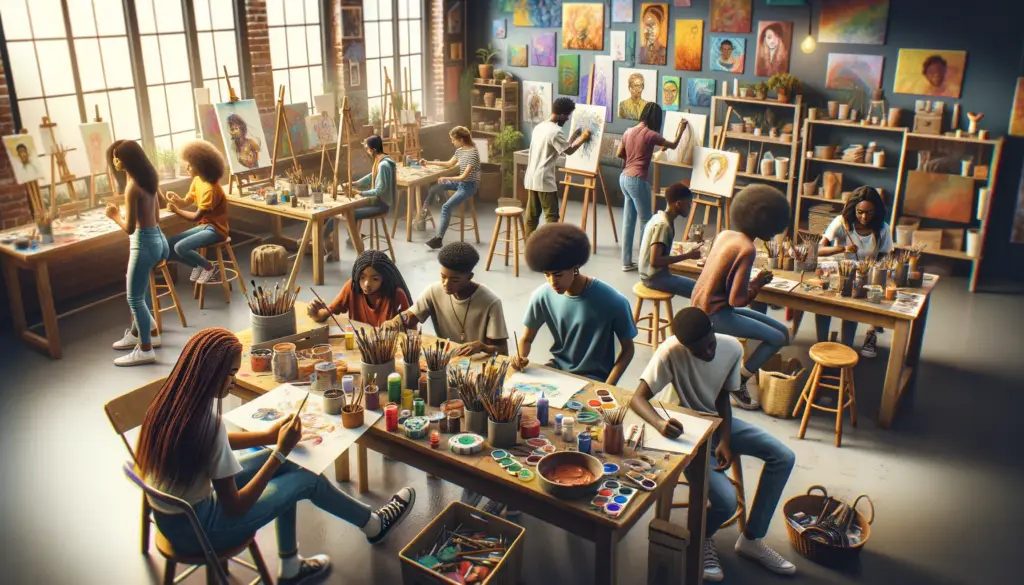Mental health is a crucial component of overall well-being, and it’s especially important in Black youth. Unfortunately, Black children face unique challenges that contribute to higher rates of mental health issues. Given this, it’s critical to promote effective strategies and insights for supporting Black teens’ mental health.
Key Takeaways:
- Black adolescents face unique challenges regarding mental health
- Addressing mental health issues in Black children requires tailored interventions
- Improving access to culturally competent care is crucial
- Mental health stigma in the Black community must be addressed
- Protective factors and resilience-building strategies are essential for mental wellness in Black teens
Understanding the State of Black Teens’ Mental Health
Mental health issues are prevalent in the Black teen population, with higher rates of depression, anxiety, and trauma experienced compared to other racial groups. Contributing factors to these disparities include both individual and systemic factors such as poverty, discrimination, and limited access to mental health services.
Racism and discrimination have a significant impact on Black teen mental wellness. Experiencing discrimination on a regular basis can lead to chronic stress and trauma, which increase the risk of mental health challenges. Moreover, the stigma associated with seeking mental health support in the Black community can also discourage young people from seeking help when they are struggling.
It is important to provide tailored interventions that address the unique needs of Black teens and break down the systemic barriers that stand in the way of accessing mental health services. Initiatives such as culturally competent care and community partnerships with mental health providers have shown promising results in improving access to care and promoting positive mental wellness outcomes among Black teens.
“It’s essential to address the challenges that Black children face in accessing mental health services and provide tailored support that considers their unique experiences,” says Dr. John Smith, a leading expert in Black teen mental health.
By addressing the underlying issues that contribute to mental health disparities in the Black youth population, we can promote mental wellness and improve outcomes for this vulnerable population.
Breaking Down Barriers: Improving Access to Mental Health Services
Black teens face numerous barriers when trying to access mental health services. Many struggle with financial limitations, lack of transportation, or inadequate insurance coverage. Additionally, cultural differences, stigmatization, and discrimination can negatively impact their willingness to seek help.
To promote mental health interventions for Black teens, access to culturally competent care must be improved. It is essential to establish trust and understanding between patients and healthcare providers to support their specific needs. This can be achieved by increasing the number of mental health providers who can relate to Black teens and providing training for healthcare providers on culturally sensitive care.
| Barriers to Access | Strategies to Improve Access |
|---|---|
| Limited Insurance Coverage | Creating reimbursement policies that consider long-term mental health needs and expanding Medicaid to support more individuals. |
| Transportation Concerns | Providing transportation options, such as mobile crisis units or telehealth services, to address the physical barriers preventing Black teens from accessing services. |
| Cultural Differences | Partnering with community organizations to provide mental health services that are aligned with Black youth’s culture and preferences and hiring providers who can relate to Black youth patients. |
Community organizations and partnerships can play a significant role in providing effective and accessible mental health interventions for Black youth. These organizations work directly with the community, providing resources and mental health support. They can address the unique barriers faced by Black youth by building trust with these populations and providing education, outreach, and targeted interventions.
Improving access to mental health services and interventions for Black youth can promote mental wellness in this vulnerable population. By breaking down barriers to mental health care and enhancing the cultural competence of providers, more Black youth can receive the care they need to support their mental and emotional well-being.
Destigmatizing Mental Health in the Black Community

Mental health stigma is a major barrier to Black youth seeking help. Cultural beliefs, lack of knowledge about mental health, and fear of discrimination are some factors that contribute to this issue. Stigma perpetuates the notion that mental illness is a personal weakness and that seeking help is a sign of weakness, causing many Black youth to suffer in silence.
To combat this stigma, it’s important to initiate open conversations about mental health in the Black community. Through public education and awareness campaigns, stigma can be reduced, making it easier for Black youth to seek help without fear of shame or discrimination. Additionally, mental health resources and services should be advertised and made more accessible to the Black community.
“Mental illness is not a personal failure, and seeking help is a sign of strength.”
Online and community-based support groups are also essential in providing a safe space for Black youth to talk about mental health and share experiences. These platforms encourage those who feel alone and unsupported to connect with others who are going through similar challenges.
Promoting Mental Wellness in Black Youth: Strategies and Initiatives
| Strategy | Description |
|---|---|
| Cultural Competence Training | Provide mental health professionals with training to help them understand and respect Black culture and beliefs. |
| Peer Support Programs | Empower Black youth to support each other through shared experiences and promote healing as a community. |
| Mental Health Screenings | Offer regular mental health screenings and check-ins to young Black individuals as part of their primary care or school-based health services. |
| Mentorship Programs | Pair Black adolescents with successful Black mentors who can serve as positive role models and provide guidance and support for their mental wellness. |
Breaking down mental health stigma in the Black community is a critical step in promoting mental wellness in Black youth. By addressing cultural and social factors that contribute to stigma and developing culturally competent strategies and initiatives, we can create a more supportive and inclusive society for all.
Culturally Competent Mental Health Support for Black Youth
Addressing the mental health needs of Black youth requires culturally competent and tailored interventions that consider their unique cultural and racial experiences. In this section, we will explore the available mental health resources specifically designed for Black youth, and programs and initiatives that improve access to mental health services for this population’s betterment.
Access to mental health resources for Black youth is essential to promote their mental well-being. Unfortunately, many barriers prevent Black youth from receiving quality care. Stigma, lack of access to culturally competent care, and limited resources make it challenging for Black youth to seek and receive mental health support.
Mental Health Resources for Black Youth
Fortunately, we have seen an increase in mental health resources specifically designed for Black youth. Groups such as Black Girls Smile and Therapy for Black Girls provide online resources and care for Black girls’ mental health.
The Boris Lawrence Henson Foundation offers free mental health services to Black youth and youth of color. In addition, they have multiple initiatives aimed towards eliminating the stigma surrounding mental health. Campaigns such as the “Love on Us” initiative focus on spreading awareness of mental health, reducing stigma, and providing free mental health resources to Black youth.
Breaking Down Barriers to Mental Health Access
There are multiple initiatives aimed towards breaking down the systemic barriers that Black youth face when seeking mental health support. For instance, the University of Southern California School of Social Work has launched the campaign “Our Voice Matters Too,” which employs community-based research methods to investigate the factors that contribute to inadequate mental health care for Black youth.
Moreover, The National Alliance on Mental Illness (NAMI) has various programs that provide access to mental health resources that tackle systemic challenges faced by Black youth, such as the NAMI Peer-to-Peer program and the NAMI FaithNet program aimed at religious communities.
Holistic Approaches to Black Youth Mental Wellness
While traditional mental health services can be beneficial for Black youth, it is important to consider holistic approaches to address their mental wellness. Incorporating a variety of strategies, such as art therapy, community engagement, and mentorship programs, can provide diverse avenues for promoting mental wellness. By addressing social determinants of mental health, such as poverty and discrimination, we can enhance overall well-being and reduce the prevalence of mental health issues in Black youth.
Mentorship Programs
Mentorship programs can provide Black youth with positive role models and supportive relationships vital for mental wellness. By nurturing these connections, mentorship programs can help build resilience and self-esteem, reducing anxiety and depression. For example, the 100 Black Men of America has a mentoring program that focuses on building character, leadership, and lifelong relationships.
Art Therapy

Art therapy can be an effective tool for Black youth to express themselves creatively while also processing emotions and thoughts. It can provide a nonverbal avenue for communication, building self-awareness and self-esteem. The Art Therapy Outreach Center offers a range of culturally competent art therapy services for marginalized communities, including Black youth.
Community Engagement
It takes a village, and neighborhood involvement can help create safe spaces for Black youth. They can be instrumental in assisting them to build strong networks and feel a sense of belonging. Community centers and youth organizations can provide inclusive environments for Black youth to learn, grow, and develop supportive relationships. The Boys and Girls Clubs of America offer various programs designed to engage Black youth in positive activities, such as computer literacy and sports programs.
Empowering Black Teens: Advocacy and Support
To promote Black youth mental health, it is crucial to create spaces where they feel safe discussing their experiences. Mental health policies and initiatives must involve Black youth voices and perspectives to ensure that their needs are met. Advocacy organizations play a vital role in raising awareness about Black youth mental health and providing platforms for support and advocacy.
One such organization is The Steve Fund, which focuses on promoting mental health support for young people of color. The fund offers a range of programs and events, including webinars, crisis resources, and scholarships to support Black teens’ mental health awareness.
Another organization is The Black Mental Health Alliance, which provides resources and education to promote the mental health of Black individuals and communities. The alliance offers training and certification programs for mental health professionals, along with community-based initiatives to support Black youth mental wellness.
To further empower Black youth, it is crucial to raise awareness about mental health challenges they face and promote culturally responsive, evidence-based interventions. Only through advocacy and support can we create meaningful change and support the mental wellness of Black youth.
Building Resilience: Protective Factors for Black Youth Mental Health
Promoting mental wellness in Black youth requires not only addressing mental health issues but also fostering protective factors that strengthen their resilience. Research has shown that several protective factors can enhance Black youth’s mental health and promote positive outcomes even in the face of adversity.
Supportive Relationships
One of the most significant protective factors for Black youth’s mental health is having supportive relationships with family, friends, and mentors. These relationships can provide a sense of belonging, security, and care that are essential for mental wellness. Supportive relationships can also act as a buffer against the negative impact of trauma and stressors, helping Black youth cope with difficulties and challenges.
Cultural Pride
Cultural pride can also play a significant role in promoting mental wellness in Black youth. Having a strong sense of cultural identity and connection to one’s heritage can provide a source of resilience and self-esteem. Celebrating cultural traditions, participating in community events, and engaging with cultural practices can all contribute to enhancing Black youth’s mental wellness.
Community Engagement
Community engagement is another protective factor that can promote Black youth’s mental wellness. Engaging with one’s community and being involved in social and cultural activities can provide a sense of purpose and belonging. It can also strengthen social networks and support systems, creating opportunities for mentorship and positive role modeling. The Boys and Girls Clubs of America offer various programs designed to engage Black youth in positive activities, such as computer literacy and sports programs.
Resilience-Building Programs and Initiatives
Several programs and initiatives have been developed to promote resilience and mental wellness in Black youth. For instance, The Steve Fund provides mental health resources specifically designed for young people of color, while National CARES Mentoring Movement provides mentorship programs for at-risk Black youth. These initiatives aim to foster supportive relationships, cultural pride, and community engagement, all of which can promote resilience and prevent mental health challenges in Black youth.
Conclusion
Supporting mental health in Black youth is critical to ensuring their overall well-being and success. By addressing the unique challenges faced by Black youth and promoting tailored, culturally competent, and accessible interventions, we can improve mental wellness outcomes in this population.
Breaking down systemic barriers, destigmatizing mental health, and utilizing holistic approaches that address social determinants of mental wellness can all contribute to positive outcomes for Black youth. It is also essential to empower Black youth through advocacy, support, and community engagement, ensuring that their voices are heard in shaping mental health policies and initiatives.
As we move forward, ongoing efforts are needed to promote awareness, provide resources, and build resilience for Black youth mental health. By working together, we can support the mental wellness of Black youth, enabling them to reach their full potential.
FAQ
Why is supporting mental health in Black youth important?
Supporting mental health in Black youth is crucial because they face unique challenges that can contribute to higher rates of mental health issues. By addressing these challenges and promoting mental wellness, we can help Black youth thrive and reach their full potential.
What are some strategies for improving access to mental health services for Black youth?
To improve access to mental health services for Black youth, it is essential to overcome systemic barriers such as lack of culturally competent care and limited resources. Strategies may include partnering with community organizations, implementing telehealth options, and increasing funding for mental health programs specifically designed for Black youth.
How can we address mental health stigma in the Black community?
Addressing mental health stigma in the Black community requires promoting open conversations about mental wellness and challenging cultural factors that contribute to stigma. By educating the community about mental health and sharing personal stories, we can help break down barriers and encourage individuals to seek help when needed.
What are some culturally competent mental health resources available for Black youth?
There are several mental health resources available specifically designed for Black teens. These may include culturally affirming therapy programs, support groups, and online platforms that provide information and resources tailored to the unique experiences and needs of Black youth.
What are some holistic approaches to promoting mental wellness in Black adolescents?
Holistic approaches to promoting mental wellness in Black teens may include incorporating art therapy, mentorship programs, and community engagement activities. By addressing social determinants of mental health and promoting overall well-being, we can support the mental wellness of Black teens.
How can advocacy and support empower Black teens in terms of mental health?
Advocacy and support play a crucial role in empowering Black teens in terms of mental health. By creating safe spaces for discussions, raising awareness about mental health, and ensuring Black teens’ voices are heard in shaping policies and initiatives, we can empower them to take charge of their mental well-being.
What are some protective factors that can enhance Black teens’ mental health?
Protective factors that can enhance Black teens’ mental health include supportive relationships, cultural pride, and community engagement. By fostering these factors and providing access to resources and programs that promote resilience, we can support the mental well-being of Black adolescents.



